Comprehensive Guide to Garden Maintenance in Hatch End
Introduction to Garden Maintenance
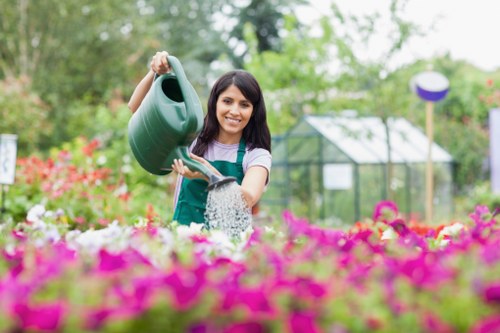
Maintaining a beautiful garden in Hatch End requires dedication, knowledge, and the right resources. Whether you're a seasoned gardener or just starting, understanding the essentials of garden care can transform your outdoor space into a vibrant, thriving haven.
Garden maintenance involves a variety of tasks, from regular watering and pruning to soil management and pest control. Each task plays a crucial role in ensuring that your plants remain healthy and your garden looks its best throughout the year.
In this article, we'll explore the key aspects of garden maintenance specific to Hatch End's climate and soil conditions, providing you with actionable tips and strategies to keep your garden flourishing.
Understanding Hatch End's Climate
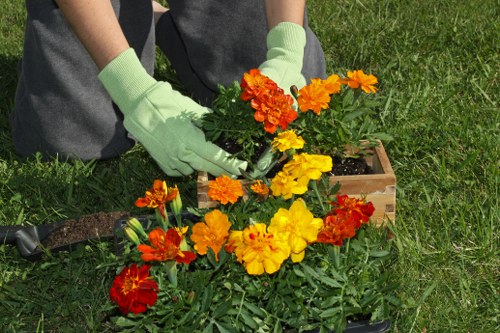
Hatch End experiences a temperate climate with distinct seasons, which significantly influences garden maintenance practices. Summers can be warm and dry, while winters are typically cool and occasionally damp. Understanding these climatic patterns is essential for planning your garden's care routine.
During the summer months, your garden will require adequate watering to cope with higher temperatures. Implementing efficient irrigation systems and mulching can help retain moisture and reduce water usage.
In contrast, the cooler and wetter winters necessitate different maintenance approaches. Protecting plants from frost, managing drainage, and preparing soil for the next planting season are critical tasks during this period.
Soil Preparation and Management
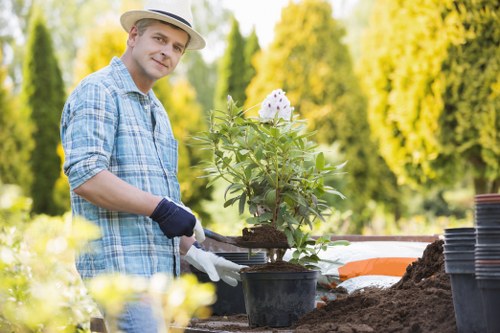
A well-prepared soil foundation is the cornerstone of successful garden maintenance. Hatch End's soil can vary, but it generally benefits from regular amendments to enhance fertility and structure.
Conducting a soil test can help determine the pH balance and nutrient levels, allowing you to tailor your soil management practices effectively. Incorporating organic matter such as compost or well-rotted manure can improve soil texture, drainage, and nutrient content.
Regularly aerating the soil and avoiding compaction are also vital for promoting healthy root growth and preventing issues like waterlogging or poor nutrient uptake.
Plant Selection and Care
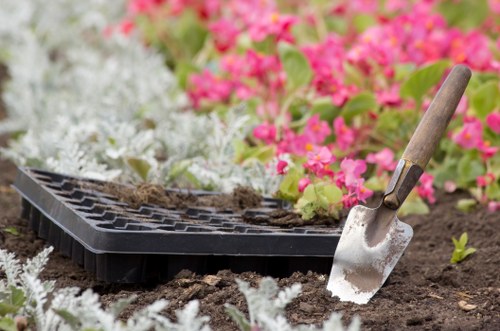
Choosing the Right Plants
Selecting plants that thrive in Hatch End's climate is crucial for minimizing maintenance efforts and ensuring garden vitality. Opt for native species or those well-suited to local conditions, as they are more resilient and require less intensive care.
Consider factors such as sunlight exposure, soil type, and moisture levels when choosing plants. Grouping plants with similar requirements together can simplify maintenance and improve overall garden health.
Regular Pruning and Trimming
Pruning is essential for maintaining plant shape, promoting healthy growth, and preventing disease. Regularly remove dead or damaged branches, thin out dense areas, and shape plants to encourage airflow and sunlight penetration.
Proper pruning techniques vary depending on the plant species, so it's important to research specific requirements or consult with a gardening professional to ensure best practices.
Irrigation and Water Management
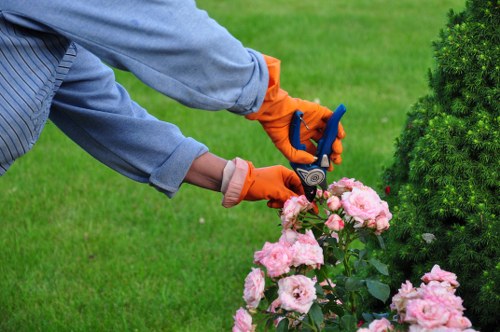
Efficient Watering Practices
Water management is a critical component of garden maintenance in Hatch End. Implementing efficient watering practices can conserve water, reduce costs, and promote healthier plant growth.
Installing drip irrigation systems or soaker hoses can deliver water directly to the plant roots, minimizing evaporation and runoff. Scheduling watering during early morning or late evening hours can further enhance efficiency.
Rainwater Harvesting
Harvesting rainwater is an eco-friendly way to supplement your garden's water supply. Setting up rain barrels or cisterns can collect and store rainwater for use during dry periods, reducing dependency on municipal water sources and lowering utility bills.
Ensure that your rainwater collection system includes proper filtration and storage to maintain water quality and prevent contamination.
Pest and Disease Control
Pests and diseases can pose significant challenges to garden health. Implementing proactive pest management strategies is essential for preventing infestations and maintaining a thriving garden.
Integrated Pest Management (IPM) combines biological, cultural, and chemical methods to control pest populations effectively. Encourage beneficial insects, such as ladybugs and bees, which naturally reduce pest numbers by preying on harmful species.
Regular monitoring and early detection of pest issues allow for timely intervention, reducing the need for extensive chemical treatments and minimizing environmental impact.
Lawn Care and Maintenance

A well-maintained lawn contributes to the overall aesthetics and functionality of your garden. Proper lawn care involves regular mowing, aerating, fertilizing, and controlling weeds to ensure a lush, green turf.
Mowing your lawn at the appropriate height encourages deeper root growth and enhances drought resistance. Avoid cutting more than one-third of the grass blade at a time to prevent stress and promote healthy regrowth.
Applying a balanced fertilizer based on soil test results can provide essential nutrients, supporting robust grass growth and improving resilience against pests and diseases.
Seasonal Garden Maintenance Tasks

Spring Maintenance
Spring marks the beginning of the active gardening season in Hatch End. Key tasks include clearing debris, pruning deciduous trees and shrubs, and preparing beds for new plantings.
Applying a pre-emergent herbicide can prevent weed seeds from germinating, reducing the need for manual weeding later in the season. Additionally, incorporating compost into garden beds enhances soil fertility and structure.
Summer Care
Summer maintenance focuses on watering, weeding, and monitoring plant health. Implementing mulch helps retain soil moisture, suppress weeds, and regulate soil temperature.
Regularly check for signs of pest activity or disease, addressing issues promptly to prevent widespread damage. Providing adequate shade and ventilation can also help plants cope with the heat.
Autumn and Winter Maintenance

As the growing season winds down, autumn and winter maintenance tasks prepare your garden for the colder months. Raking fallen leaves, cutting back perennials, and protecting tender plants are essential steps during this period.
Adding a layer of mulch around plant bases can insulate roots against frost and temperature fluctuations. It's also an ideal time to plant bulbs for spring blooms, ensuring a colorful start to the new growing season.
Cleaning and storing garden tools properly prevents rust and extends their lifespan, ensuring they're ready for use when the gardening season resumes.
Tools and Equipment for Garden Maintenance

- Pruning Shears: Essential for trimming and shaping plants.
- Garden Fork: Useful for aerating soil and incorporating compost.
- Hose and Irrigation Systems: Vital for consistent watering practices.
- Lawn Mower: Keeps your lawn neat and well-maintained.
- Weeding Tools: Help manage and remove unwanted plants efficiently.
Investing in high-quality garden tools and maintaining them properly can greatly enhance the efficiency and enjoyment of your garden maintenance tasks.
Professional Garden Maintenance Services

While DIY garden maintenance can be rewarding, professional services offer expertise and resources that can elevate your garden's condition.
Hiring local garden maintenance professionals in Hatch End ensures that your garden receives tailored care based on regional conditions and best practices. Professionals can handle complex tasks such as tree pruning, pest management, and landscape design with precision and expertise.
Outsourcing maintenance tasks can also free up your time, allowing you to enjoy your garden without the stress of upkeep.
Eco-Friendly Gardening Practices

Organic Gardening
Adopting organic gardening practices promotes a healthy ecosystem and reduces environmental impact. Using natural fertilizers, compost, and biological pest controls can enhance soil health and plant resilience.
Avoiding synthetic chemicals minimizes the risk of contaminating soil and water sources, creating a safer environment for both plants and wildlife.
Water Conservation
Implementing water-saving techniques, such as rainwater harvesting and efficient irrigation, conserves water resources and supports sustainable gardening.
Choosing drought-resistant plants and utilizing mulching can further reduce water consumption, ensuring your garden remains vibrant even during dry spells.
Creating a Garden Maintenance Schedule
Developing a structured maintenance schedule helps ensure that all aspects of your garden receive timely attention. A well-planned schedule can prevent tasks from being overlooked and maintain garden health year-round.
Consider breaking down maintenance tasks into daily, weekly, monthly, and seasonal activities. This approach allows for manageable workloads and consistent care.
Utilize gardening apps or planners to keep track of tasks and progress, making it easier to stay organized and efficient in your garden maintenance efforts.
Common Garden Maintenance Mistakes to Avoid

- Overwatering: Can lead to root rot and other plant diseases.
- Under-Pruning: May cause plants to become overgrown and unhealthy.
- Ignoring Soil Health: Neglecting soil fertility can stunt plant growth and reduce garden productivity.
- Poor Pest Management: Allowing pests to proliferate can damage plants and disrupt garden balance.
- Lack of Planning: Failing to plan for seasonal changes can result in neglected garden areas.
By being aware of these common pitfalls, you can adopt practices that promote a healthy and beautiful garden.
Benefits of Regular Garden Maintenance

Regular garden maintenance offers numerous benefits, enhancing both the aesthetic appeal and functionality of your outdoor space.
Well-maintained gardens provide a relaxing environment, increase property value, and can even contribute to local biodiversity by supporting various plant and animal species.
Consistent maintenance also reduces the likelihood of major issues arising, saving time and resources in the long run.
Conclusion

Effective garden maintenance in Hatch End requires a blend of knowledge, consistent effort, and strategic planning. By understanding the unique conditions of your local environment and implementing best practices, you can cultivate a garden that thrives throughout the year.
Whether you choose to manage your garden independently or enlist professional help, prioritizing regular maintenance tasks will ensure your outdoor space remains a beautiful and inviting retreat.
Ready to transform your garden? Contact us today to schedule your garden maintenance service and take the first step towards a stunning, well-kept garden in Hatch End.
